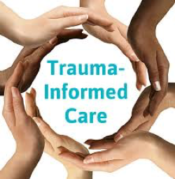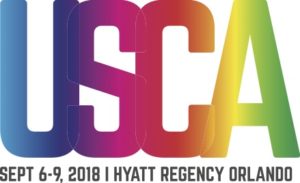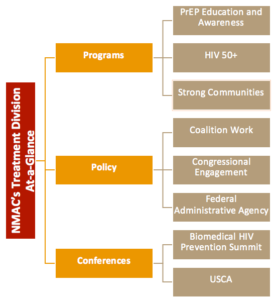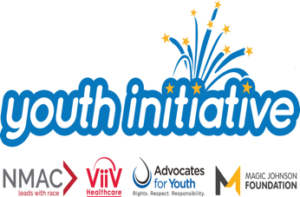2018 Vision

2017 was a difficult political year. Unfortunately, 2018 looks to be equally challenging. President Trump requires that we up our game. There are real lives and real money on the line. Our movement’s long-term success or failure will be greatly shaped by what happens over the next three years. 2018 is particularly important because of the midterm elections, implementation of the tax reform, getting rid of the individual mandate for health insurance, and Congress looking to cut $1.5 trillion in federal spending to pay for the tax cuts. They are seriously considering cuts to Medicare and Medicaid.

NMAC’s 2018 Vision centers on four priorities. These priorities require significant collaboration (internal and external). NMAC remains committed to lead with race to end HIV/AIDS. Biomedical HIV prevention is our greatest hope for building pathways to end the epidemic.
2018 Priorities
Constituent Advisory Panels
Trauma Informed Care
2018 Midterm Election
FY19 Budget
The four priorities address concerns from constituents about not being heard, provide a model that might explain why people are color are not retained in healthcare, and make a priority of NMAC’s collaborative efforts to fight for the federal domestic HIV portfolio.
2018 will be a real test of partnerships. NMAC will rely on our colleagues like never before and, hopefully, they can also rely on us. We must show up ready to fight and collaborate. Our ability to bring together diverse coalitions will be our major contribution. Last year taught us that we are stronger together. In this messy political world, NMAC must never cower. Even in the most difficult of situations, we must speak truth to power, lead with race, and continue to believe that we can end the epidemic.
2018 Political Environment Scan
2017 was a wild ride. As a country, we jumped from one challenge to another. While most were not directly about HIV, the challenges were definitely HIV adjacent and gave pause. 2018 won’t be different.
The good news is that whenever HIV hit the press, many communities stood in defense. When the Washington Post published its story on banned words, many others came to the defense of free speech. The same is also true when the administration disbanded PACHA. Our field is deep and strong and has many allies. Unlike during other administrations, our community is not going to sit back and take it. People will stand with our movement, mostly.
In order to cover the $1.5 trillion deficit caused by the tax cut, some Members of Congress want to cut programs that directly and indirectly impact the lives of people living with HIV. Not only is HIV funding at risk, but healthcare in general is at a tipping point. The bill to cut taxes also got rid of the individual health insurance mandate, which will destabilize health insurance markets in many states. Will the marketplaces survive when premiums significantly increased because healthy people are no longer required to get insurance?
2018 Priorities
Constituent Advisory Panels (CAP)
NMAC needs to respond to concerns raised by constituents during USCA and the Summit. Constituent Advisory Panels or CAPs are a 2018 priority. While most of the anger was not about us, it is important for the agency to seriously address their concerns. NMAC will hire a new position in Conferences to oversee CAP. However, addressing NMAC’s issues with constituents will not end the frustration and anger that our people feel. Life in Trump’s America is very difficult for people who are different.
CAPs are still a fluid concept and Conferences will lead NMAC’s efforts to identify final solutions. NMAC is committed to creating real solutions to set up CAPs that really support the agency to do better and to give our constituents the respect and love they deserve.
Trauma Informed Care (TIC)
 Why are people of color retained in care at lower rates than their white counterparts? Studies show this is the major reason why we have poor health outcomes, not access. Rather than just point out this inequity, NMAC seeks solutions from the concept of trauma informed care (TIC), particularly when the trauma is connected to racism, sexism, transphobia, xenophobia, homophobia, or HIV-phobia. There is significant post-traumatic stress from the early days of the epidemic. While the virus does not cause isolation and depression, too many people over 50 living with HIV suffer with these and other challenges.
Why are people of color retained in care at lower rates than their white counterparts? Studies show this is the major reason why we have poor health outcomes, not access. Rather than just point out this inequity, NMAC seeks solutions from the concept of trauma informed care (TIC), particularly when the trauma is connected to racism, sexism, transphobia, xenophobia, homophobia, or HIV-phobia. There is significant post-traumatic stress from the early days of the epidemic. While the virus does not cause isolation and depression, too many people over 50 living with HIV suffer with these and other challenges.
It’s time to bring HIV-related depression out of the closet. Folks do not have to suffer. There is help and medications that can make it better. That’s why TIC is so interesting. Trauma informed care is an organizational structure and treatment framework that involves understanding, recognizing, and responding to the effects of all types of trauma. TIC also emphasizes physical, psychological, and emotional safety for both consumers and providers and helps survivors rebuild a sense of control and empowerment. The trauma experienced by many members of our community cannot be underestimated. TIC may not be the ultimate solution for what faces people of color living with HIV, but it’s important to have options that start to address this inequity.
 2018 Midterm Elections
2018 Midterm Elections
The results of the midterm elections could impact the next generation of our work. Since HIV care = HIV prevention, our ability to end HIV depends on our ability to implement a comprehensive biomedical HIV prevention strategy. Ending HIV also needs money. Only the federal government has the resources needed. NMAC must work with either party, but there is a huge difference in strategy when Republicans vs. Democrats are in power.
As a nonprofit, NMAC cannot tell our constituents who to vote for, but we can work to get out the vote. Can a small organization like NMAC do anything to make a difference in the midterm elections? The sensible answer is “no.” But can we live with doing nothing?

FY19 Budget
Once again, we find ourselves in a battle to save the domestic HIV portfolio. As was said in the past, this really is a real critical year. The House wants to balance the budget by cutting everything but defense. They need to cut $1.5 trillion in federal spending to pay for the tax cuts. Certain members have suggested cutting entitlements. Cuts in Medicaid or Medicare will have profound impact. This is especially true for PLWH who get their health insurance via expanded Medicaid.
The federal budget is not usually cut in election years; however, these are not ordinary times. We need to be ready for a fight. Last year NMAC started its “Golden Ticket” editorial and social media campaign. NMAC will continue this work and once again use the August recess to target members.
This 2018 Vision requires lots of hard work and collaboration (internally and externally). Our constituents demand that we work together to shape and fight for a world without HIV. This vision is how NMAC can survive and fight back during these difficult political times.
Yours in the Struggle,

Paul Kawata
Executive Director
NMAC
 LINC provides community-based organizations with assistance to strengthen and sustain organizational infrastructures that support high impact HIV prevention services. This is accomplished by providing free training, technical assistance, and resources for activities related to:
LINC provides community-based organizations with assistance to strengthen and sustain organizational infrastructures that support high impact HIV prevention services. This is accomplished by providing free training, technical assistance, and resources for activities related to:















